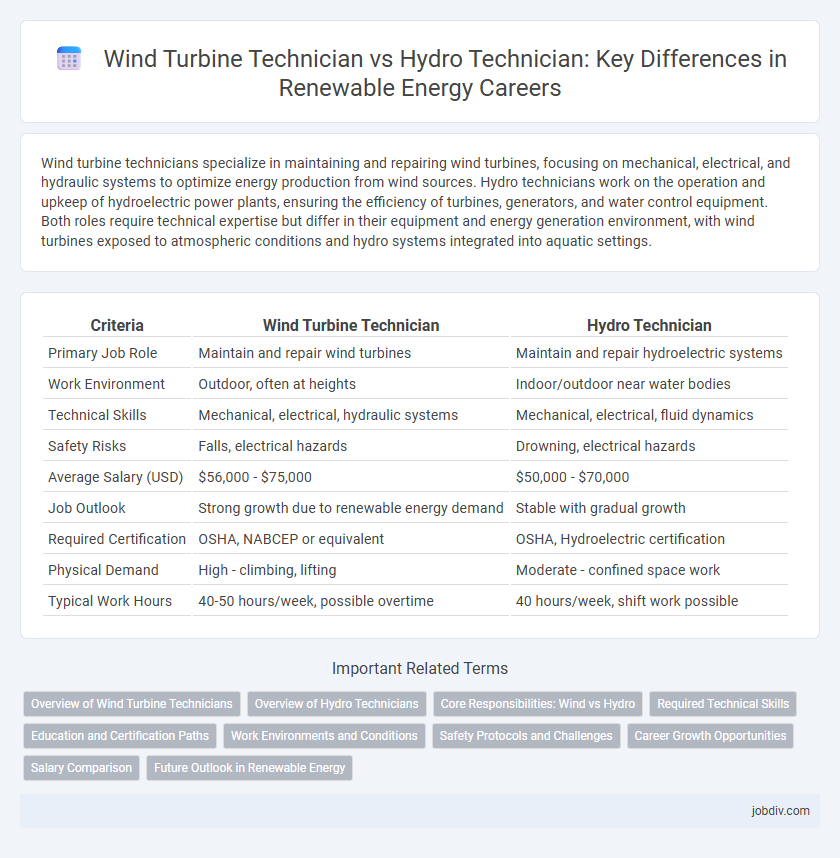Wind turbine technicians specialize in maintaining and repairing wind turbines, focusing on mechanical, electrical, and hydraulic systems to optimize energy production from wind sources. Hydro technicians work on the operation and upkeep of hydroelectric power plants, ensuring the efficiency of turbines, generators, and water control equipment. Both roles require technical expertise but differ in their equipment and energy generation environment, with wind turbines exposed to atmospheric conditions and hydro systems integrated into aquatic settings.
Table of Comparison
| Criteria | Wind Turbine Technician | Hydro Technician |
|---|---|---|
| Primary Job Role | Maintain and repair wind turbines | Maintain and repair hydroelectric systems |
| Work Environment | Outdoor, often at heights | Indoor/outdoor near water bodies |
| Technical Skills | Mechanical, electrical, hydraulic systems | Mechanical, electrical, fluid dynamics |
| Safety Risks | Falls, electrical hazards | Drowning, electrical hazards |
| Average Salary (USD) | $56,000 - $75,000 | $50,000 - $70,000 |
| Job Outlook | Strong growth due to renewable energy demand | Stable with gradual growth |
| Required Certification | OSHA, NABCEP or equivalent | OSHA, Hydroelectric certification |
| Physical Demand | High - climbing, lifting | Moderate - confined space work |
| Typical Work Hours | 40-50 hours/week, possible overtime | 40 hours/week, shift work possible |
Overview of Wind Turbine Technicians
Wind turbine technicians specialize in installing, maintaining, and repairing wind turbines, focusing on mechanical, electrical, and hydraulic systems to optimize energy production. Their expertise includes troubleshooting electrical components, performing routine inspections, and ensuring compliance with safety regulations in wind farms. Compared to hydro technicians, wind turbine technicians work primarily with wind energy conversion technology and require specialized knowledge in aerodynamics and turbine blade maintenance.
Overview of Hydro Technicians
Hydro Technicians specialize in maintaining and repairing hydroelectric power systems, ensuring efficient energy generation from water resources. They handle tasks such as monitoring turbine operations, inspecting generators, and troubleshooting electrical and mechanical issues in hydroelectric plants. Their expertise in water flow management and system diagnostics is crucial for sustainable and reliable hydro power production.
Core Responsibilities: Wind vs Hydro
Wind turbine technicians specialize in maintaining, inspecting, and repairing large-scale wind turbines, focusing on blade integrity, generator performance, and electrical systems to ensure optimal wind energy production. Hydro technicians are responsible for the operation and upkeep of hydroelectric power plants, managing turbine units, hydraulic systems, and electrical components to maximize water flow efficiency and energy output. Both roles require expertise in mechanical and electrical systems, but wind technicians concentrate on atmospheric energy conversion, while hydro technicians focus on water-driven power generation.
Required Technical Skills
Wind turbine technicians require expertise in electrical systems, mechanical repairs, and blade inspection, alongside knowledge of turbine control systems and safety protocols. Hydro technicians must be skilled in hydraulics, turbine repair, electrical maintenance, and monitoring of water flow and pressure systems. Both roles demand proficiency in diagnostic tools and adherence to industry safety standards for maintaining renewable energy equipment.
Education and Certification Paths
Wind turbine technicians typically pursue a certificate or associate degree in wind energy technology, often requiring FAA safety training and OSHA certification. Hydro technicians usually need specialized training in hydropower systems, with certifications like NACE corrosion certification and NABCEP for renewable energy proficiency. Both roles benefit from hands-on apprenticeships and technical education focused on energy equipment maintenance and safety standards.
Work Environments and Conditions
Wind Turbine Technicians typically work outdoors on wind farms, often in remote or elevated locations subject to varying weather conditions including high winds and cold temperatures, requiring physical endurance and safety awareness. Hydro Technicians generally operate in hydroelectric power plants or dam sites, working indoors around heavy machinery and water flow systems, with environments that can be humid and noisy but more sheltered from extreme weather. Both roles demand technical expertise and adherence to safety protocols, but Wind Turbine Technicians face more exposure to environmental elements while Hydro Technicians engage with complex mechanical and hydraulic systems in controlled settings.
Safety Protocols and Challenges
Wind turbine technicians face unique safety challenges including working at heights exceeding 300 feet and exposure to harsh weather conditions, requiring stringent fall protection and rescue protocols. Hydro technicians deal with confined spaces, electrical hazards, and high-pressure water systems, necessitating rigorous lockout-tagout procedures and specialized personal protective equipment. Both roles demand continuous safety training to mitigate risks associated with mechanical failures, electrical shocks, and environmental factors inherent in renewable energy environments.
Career Growth Opportunities
Wind Turbine Technicians experience rapid career growth due to the expanding global wind energy sector, with opportunities in turbine maintenance, installation, and advanced system diagnostics. Hydro Technicians benefit from stable demand in hydroelectric power plants, focusing on mechanical and electrical system upkeep, but growth is often tied to infrastructure development and modernization projects. Both careers offer specialized skill advancement, yet wind energy's accelerated adoption drives more dynamic promotion and training options.
Salary Comparison
Wind turbine technicians earn an average salary of $56,000 per year, benefiting from the expanding wind energy sector and competitive pay scales in renewable energy jobs. Hydro technicians typically receive slightly higher median wages around $60,000 annually due to specialized skills required for maintaining hydroelectric facilities and managing water flow systems. Salary variations depend on location, experience, and certifications, with both roles offering growth aligned with the global shift toward sustainable energy solutions.
Future Outlook in Renewable Energy
Wind turbine technicians are projected to experience faster job growth, with a 61% increase from 2021 to 2031, driven by expanding offshore and onshore wind farms. Hydro technicians face moderate growth due to the slower pace of new hydropower installations but benefit from ongoing maintenance and modernization of existing facilities. The shift towards scalable, cost-effective wind energy solutions positions wind turbine technicians at the forefront of renewable energy employment opportunities.
Wind Turbine Technician vs Hydro Technician Infographic

 jobdiv.com
jobdiv.com